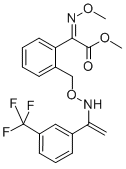Trifloxystrobin 肟菌酯
Introduction: Trifloxystrobin is a synthetic derivative of the naturally occurring strobilurins found in several genera of wood-decaying fungi such as Strobilurus tenacellus. It is a strobilurin foliar fungicide. Trifloxystrobin inhibits mitochondrial respiration by blocking electron transfer within the respirator chain. Therefore, trifloxystrobin is a potent inhibitor of 2 fungal spore germination and mycelial growth. It has a high level of activity against many fungal pathogens within the Ascomycete, Deuteromycete, Basidiomycete, and Oomycete classes. Pests controlled by trifloxystrobin include grape and cucurbit powdery mildew, apple scab and powdery mildew, peanut leafspot, and brown patch of turfgrass. It could be applied to cereals, ornamental, vegetables (carrots, asparagus, cucurbits, fruiting vegetables, root vegetables (except radish)), fruits (apples, pears, grapes, strawberries) and tropical crops.
Common name: Trifloxystrobin
Another name: CHEBI:81833; CGA 279202; Methyl (2E)-2-methoxyimino-2-[2- [[(E)-1-[3-(trifluoromethyl)phenyl]ethylideneamino]oxymethyl]phenyl]acetate; SCH EMBL19148; etc.
Chemical name:
methyl (E)-methoxyimino-{(E)-α-[1-(α,α,α-trifluoro-m-tolyl)ethylideneaminooxy]- o-tolyl}acetate
Empirical formula: C20H19F3N2O4
Structural formula:

Mol. Weight: 408.37 g/mol
CAS No.: 141517-21-7
Specifications
Leading Trifloxystrobin supplier
Trifloxystrobin 95% TC
Trifloxystrobin 50% WDG
Packing:
BULK PACKING
Powder: 25kg/Bag, 25kg/Drum, 50kg/Drum etc.
Liquid: 200L/Drum, 20L/Drum, 10L/Drum etc.
SMALL PACKING
Powder: 1kg/Alu bag, 500g/Alu bag, 200g/Alu bag, 100g/Alu bag, 50g/Alu bag, 15g/Alu bag etc.
Liquid: 5L/Drum, 1L/Bottle, 500ml/Bottle, 250ml/Bottle, 100ml/Bottle, 50ml/Bottle etc.
Customerized packing label
Trifloxystrobin FAO standard
Professional registration
HAZARDS IDENTIFICATION
Hazard statement(s)
H317 (100%): May cause an allergic skin reaction.
H400 (100%): Very toxic to aquatic life.
H410 (100%): Very toxic to aquatic life with long lasting effects.
Precautionary statement(s)
P261: Avoid breathing dust/fume/gas/mist/vapors/spray.
P272: Contaminated work clothing should not be allowed out of the workplace.
P273: Avoid release to the environment.
P280: Wear protective gloves/protective clothing/eye protection/face protection.
P302+P352: IF ON SKIN: wash with plenty of water.
P321: Specific treatment (see ... on this label).
P333+P313: IF SKIN irritation or rash occurs: Get medical advice/attention.
P363: Wash contaminated clothing before reuse.
P391: Collect spillage.
P501: Dispose of contents/container to an approved waste disposal plant.
Supplemental Hazard Statements: none.
MAMMALIAN TOXICOLOGY
Acute toxicity: 1) Acute oral LD50 for rats is >5000 mg/kg. 2) Acute dermal LD50 for rats is >2000 mg/kg. 3) Acute inhalation toxicity LC50 (4 h) for rats is >4.6 mg/L. 4) Skin irritation: Non-irritating to skin (rabbits). 5) Eye irritation: Non-irritating to eyes (rabbits). 6) Skin sensitization for guinea pig: Sensitizer (Magnusson & Kligman test).
NOEL: (2 y) for rats is 30 mg/kg/day; (18 m) for mice is 36 mg/kg/day; (1 y) for dogs is 5 mg/kg/day. Other Not carcinogenic. Not genotoxic.
ADI (JMPR) 0-0.04 mg/kg b.w. [2004]
Classification:
WHO Classification: U (Unlikely to present an acute hazard)
EC Risk Classification: Xn - Harmful: R43; N - Dangerous for the environment: R50, R53
US EPA Classification (formulation): III (Caution - Slightly toxic)
ECOTOXICOLOGY
Effect on birds: Acute oral LD50 for Bobwhite quail is >2000 mg/kg. Effect on fish: Acute LC50 (96 h) for Rainbow trout is 0.022 mg/l. Effects on aquatic invertebrates: Acute EC50 (48 h) for Daphnia magna is 0.011 mg/l. Effects on algae: Acute 72 hour EC50 for Scenedemus subspicatus is 0.0053 mg/l. Effects on bees: contact acute 48 hour LD50 is >100 μg/bee, oral acute 48 hour LD50 is >110 μg/bee. Effects on earthworms: Acute 14 day LC50 is >1000 mg/kg.
ENVIRONMENTAL FATE
Animals In rats, absorbed from the gastrointestinal tract, rapidly metabolised and quickly and completely eliminated from the body. Plants Metabolic profile is similar for a range of crops. Based on wheat, apple, cucumber and sugar beet metabolism data, trifloxystrobin is considered as the residue of concern for food and feed commodities of plant origin. Soil/Environment Dissipates rapidly from soil and surface water. Soil DT50 4.2-9.5 d. Koc 1642-3745. No leaching potential. In water, DT50 0.3-1 d, DT90 4-8 d.
Usage: Trifloxystrobin was introduced by Novartis Crop Protection AG (became Syngenta AG). It is a strobilurin foliar applied fungicide for control of certain foliar, stem and root diseases.
Application: Biochemistry Inhibits mitochondrial respiration by blocking electron transfer at the Qo centre of cytochrome bc1. Mode of action Mesostemic, broad-spectrum fungicide with preventative and specific curative activity and displaying rain-fastness. Redistributed by superficial vapour movement and also has translaminar activity. Uses Broad spectrum fungicide for foliar use on a wide range of agricultural and horticultural crops in temperate, sub-tropical and tropical climates in open fields or protected under glass and plastic. In Europe its uses will be focussed on cereals (at 50 g/ha), grapes (at 187.5 g/ha), pome fruit (at 75 g/ha), and cucurbit crops (at 187.5 g/ha).Trifloxystrobin is active against fungi in all four classes - Ascomycetes, Deuteromycetes, Basidiomycetes and Oomycetes.







